Written by: Shahida JJ
Posted on: February 19, 2016 | 
Muzaffar in Shimshal Valley
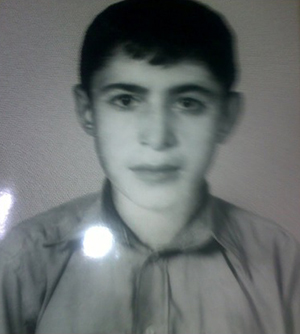
"When my older brother and I crossed the arduous route from my village to Passu village on the KKH, my brother carried me piggyback when crossing freezing waterways. I saw the glistening black road, the newly constructed Karakoram Highway built by Chinese and Pakistani army engineers, completed in 1979. I was terrified to see a huge monster with enormous eyes heading towards me. With a pounding heart, I ran up the mountain as fast as I could and stopped only when I was at the top of the mountain, my brother yelling at me, "Come down, come down. People will laugh at you!"”
The “huge monster” was a Chinese construction Bulldozer that Muzaffar had seen for the first time in his young life. He later narrated this incident to an interviewer on BBC Radio.
Muzaffar did his MBA degree from Quaid-e-Azam University and later joined the Aga Khan Rural Support Programme (AKRSP) as an intern, and worked there for 22 years, slowly but surely rising up the organization's ladder.
In 2004, he won the merit Chevening Scholarship for a master's degree at Oxford University, UK, and completed it in a year. He narrates: "The day I arrived at Oxford, UK, my brother called me from my village, Shimshal, and informed me that a jeep had arrived in Shimshal for the first time that day. I wept with happiness"
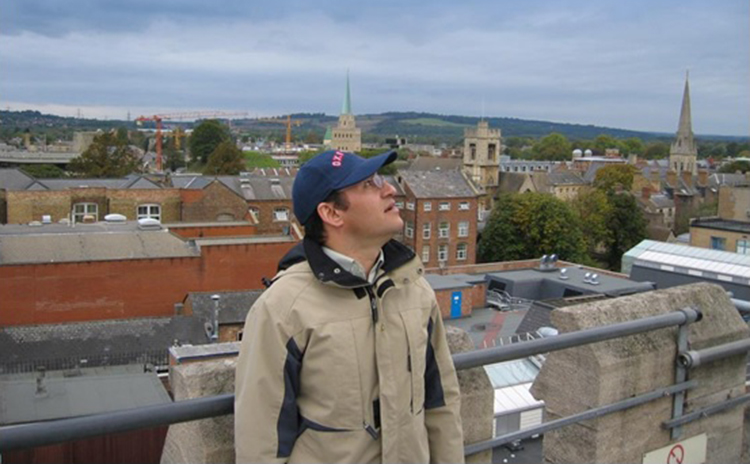
During Oxford Class Orientation the next morning, the Professor asked all students, "What has been the most exciting day of your life?" Almost all students responded, "Coming to Oxford". Muzaffar narrates: "I said, the most exciting day of my life was yesterday, when a jeep drove up to my village Shimshal for the first time!" The professor and students were amazed to hear that.
"Shimshal is a village located in Gojal, Hunza–Nagar District, in the Gilgit-Baltistan region of Pakistan. It lies at an altitude of 3,100 m above sea level, and is the highest settlement in the Hunza Valley. It is the bordering village that connects Gilgit-Baltistan with China, over the Pamir Mountains. The total area of Shimshal is 3,800 sq. km, and there are around 2,000 inhabitants with a total of 240 households.
As Shimshal was not connected by road to the nearest village, Passu (46 km away), all residents had to cross 12 snowmelt rivers and one very long glacier, which took one-and-a half hour to cross, spending 3 nights en route in community-constructed stone and mud travel homes known as Musafir Khana – travellers’ rest homes, maintained by men and women of the Volunteer Corps of Shimshal.
The non-metallic jeep able road from Passu on the KKH to Shimshal was finally completed in October 2004. Construction on the road began in 1985 by the Aga Khan Rural Support Programme (AKRSP) and the people of Shimshal, which was completed in nineteen years (1985-2004), thanks to the dedication and self-help of Shimshalis.
Shimshalis use numerous seasonal mountain grasslands, located at a several days’ walk from the village towards the China boarder, to sustain herds of yaks, goats and sheep – their main source of wealth.
The people of Shimshal are Wakhi, and they speak the Wakhi language. They belong to the Ismaili sect of Shia Islam.
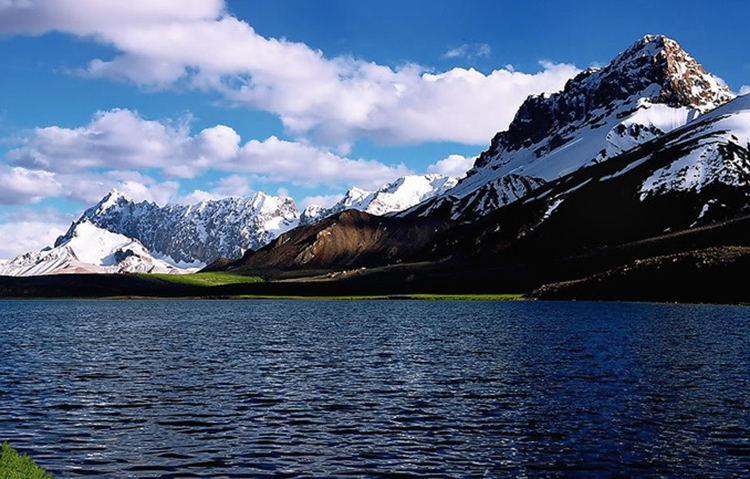
My (the author's) first visit to Shimshal was on the Aga Khan Helicopter in 1991, when the AKRSP flew its professional staff to impart training to men and women of Shimshal, and provide input for improved livelihoods.
As a student, when Muzaffar returned home for his summer vacations, the entire three months, just like other young men, he was required by his community to work on the construction of the Shimshal road, hanging from steep slopes tied with ropes and using drilling machines to break white limestone/marble in the mountains for road construction.
It was the summer of 1987. Muzaffar was returning home to Shimshal for his summer vacation, riding on the NATCO (Northern Areas Transport Co.) bus, a 26-hour bus ride from Islamabad to Gilgit. A young Japanese man was seated next to him. Muzaffar was tired and sleepy, but the man seemed very keen to start a conversation with him. They soon began talking. The young man was from a University in Japan, and his purpose of traveling to the Northern Areas was, in his words, "To find a place where I can find real happiness and wealth".
Muzaffar suggested that the man should visit his village, Shimshal, where he will find real happiness and wealth, as all lived with nature. For directions, he asked him to stop by at a tourist hotel in Passu, Hunza, and ask the manager of the hotel, who was his cousin.
The encounter was soon forgotten, and Muzaffar was home in his village and began his community-assigned mandatory work of road construction. One day, when he was at the construction site, hanging with ropes, covered in the white limestone dust while drilling, his companions shouted to him that a guest was asking for him. To his surprise, it was the same Japanese man, who had come all the way on foot with his backpack looking for him – to find real happiness and wealth in his village.
His name was Hediki Yamouchi. Muzaffar took Hediki home. They did the normal drill of crossing several rivers and walking over a long glacier before arriving in Shimshal, where over 200 households lived the same lifestyle, in similarly constructed stone and mud homes, growing their own vegetables, wheat and barley and owning yaks. The women walked their Yak herds to the high mountain pastures during the summer, collecting butter and ghee (butter oil), drying apricots and other fruits, vegetables and yak meat to sustain them through the severe winter months.
All were enjoying real happiness and wealth in their own environment in the village – as they knew of no other life to compare with. They sent all of their young children to local schools, and the older ones were sent down country to the rest of Pakistan for higher studies, spending whatever money they had on their children. All children were given important lessons in life: respect for God-given nature and environment, for elders and family, living within their means, sharing and giving of themselves.
After his visit to Shimshal, Hediki Yamouchi brought numerous other Japanese scholars who conducted researches in Shimshal, studying anything and everything. The exchange scholars became regular visitors, and also took young Shimshalis to visit Japan.
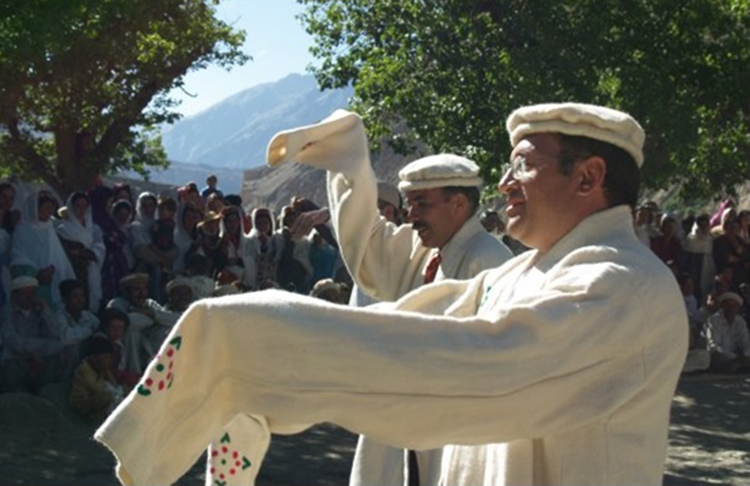
Muzaffar was invited to Japan and was honored by the Nihon University Tokyo, where His Excellency, The Emperor of Japan was the Chief Guest at a university event. Muzaffar, along with the president of the university, were seated on the stage – a place of honor.
Muzaffar did not understand the significance of the Emperor of Japan and the president of the university's presence at the event and on the stage, and why he was seated along with them. Smiling, he said, "The Emperor spoke at the event, the president of the university spoke, and I was asked to speak, and I spoke. I don't remember what I said, but I spoke in the little English that I knew, and I said something!
Laughing, he said, "If it was today, and I was in the presence of His Excellency, The Emperor of Japan, I would not be able to utter a single word out of nervousness"!
His photos were on the walls (including a huge poster of him drilling the white marble mountain), all covered in white dust, taken by his Japanese friend.
Through Muzaffar, the Japanese discovered "real happiness and wealth in the living ways of the people of Shimshal", and therefore decided to honor him. This event marked the beginning of the formation of the Shimshal Nature Trust (SNT). Several research books have been written on Shimshal village and its people, their mountain life, environment and natural wild life.
It has been 28 years of scholarly partnership and exchange programs between Shimshal, Hunza and Japanese scholars, continuing even today.
Muzaffar joined the Aga Khan Rural Support Programme (AKRSP) as a young intern in 1991 after completing his MBA degree from Quaid-e-Azam University, Islamabad as a young intern, and he worked with me (the author). He was very bright, hardworking and enthusiastic, and had tremendous determination to succeed in life. Later, he joined the AKRSP as professional staff in 1993 and worked with great dedication and professionalism for 22 years.
He would visit his village regularly, carrying huge loads of life essentials on his back, walking three days, crossing over a dozen freezing snowmelt rivers and glaciers.
Muzaffar has visited scores of countries for work and studies; he was regularly in Afghanistan working with the Aga Khan Foundation programs, with rural communities, improving their quality of life.
Muzaffar was, and is, extremely polite, gentle, and friendly; a humane human being, a thorough professional and a gentleman. The lives of his family and his people are dedicated to helping and serving their families, community and country – Pakistan.
Muzaffar has six brothers and sisters. Through sheer hard work and a focus on education, all are very highly educated and successful professionals. I marvel at his parents, who instilled in their children hard work, integrity, and the gift of giving of themselves to others – family, community, their country, and humanity at large.
Today, Muzaffar resides in Islamabad, and is the Country Director for BRAC International Pakistan, a world-renowned development programme. His Islamabad home is buzzing all the time with young family members who travel to and fro, from cities within Pakistan and abroad, pursuing higher studies from prestigious educational institutions. His home is a mehman khana (a centre for guests), much like local Shimshal. His wife Yasmin cooks and cares for guests all the time
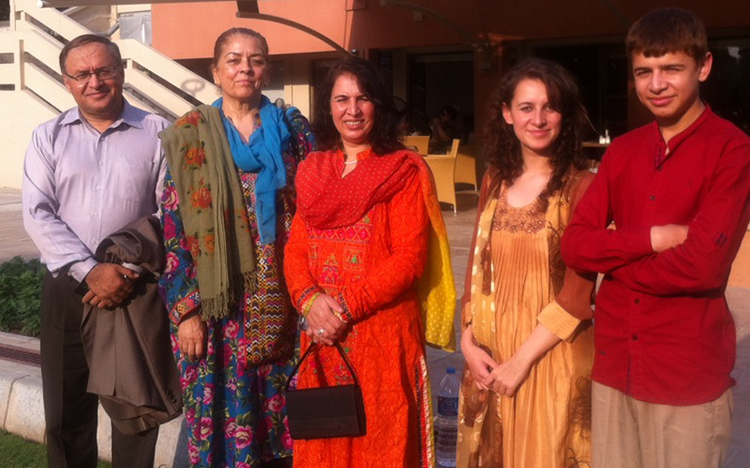
Education is the top priority for Muzaffar and his family. Everyone in his family has received quality higher education. This is equally true for the entire Hunza region, where every child goes to school. "My parents took education like fighting a war", says Muzaffar. When Muzaffar began work and started earning an income, his visionary father had advised him to invest in the education of his siblings, and then his nephews and nieces. Muzaffar did exactly that, and continues following his great father’s advice – education on War footing. Of course, he is doing that for his four children too – his two daughters and two sons are attending prestigious educational institutions in Islamabad.
Today, they have to cross the 26 km long Attabad Lake in Hunza, which was created after the Attabad Mountain fell into Hunza River, on flat-bottomed boats and wide rafters (the lake freezes in winter). After that, they take a 3-hour jeep ride to reach Shimshal. 26 km of the KKH is under the water of the lake, which is 340 feet deep. Life in that region is a constant battle for survival.
From a timid 9-year-old dashing up a Karakoram mountain on seeing a “huge monster”, to sharing the stage with the Emperor of Japan, to getting a Master’s degree from Oxford University, to capping the prestigious position of Country Director at BRAC International – Muzaffar's life journey is quite the undertaking for a young man from Shimshal, Hunza, Gilgit-Baltistan, Pakistan, for all of us to emulate.
You make us all proud!
You may also like: